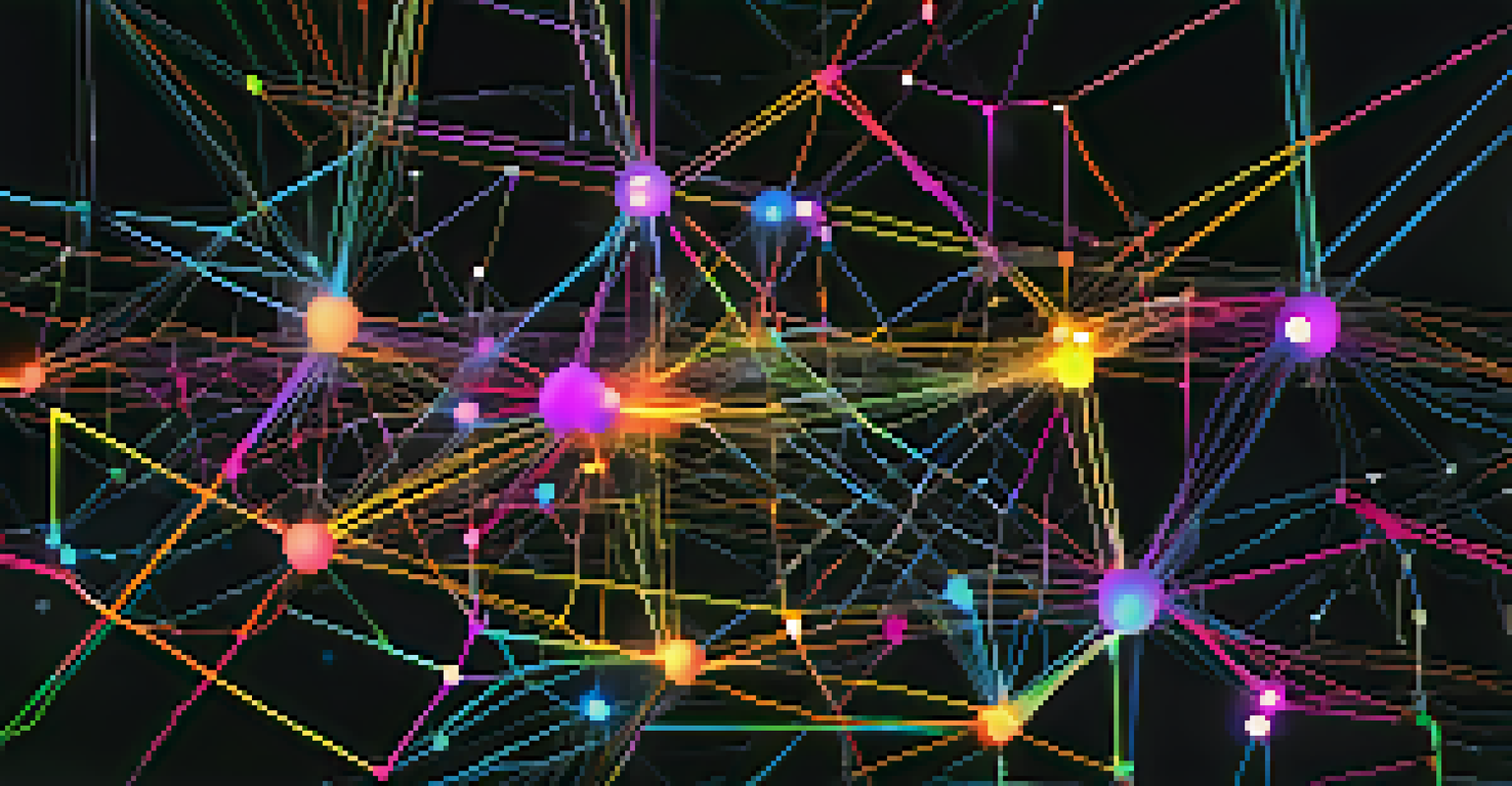The Impact of Machine Learning on Health Data Analytics

Understanding Machine Learning in Healthcare Analytics
Machine learning is a subset of artificial intelligence that focuses on enabling computers to learn from data and improve over time. In healthcare, this technology helps analyze vast amounts of patient data to identify patterns and insights that can enhance patient care. For instance, algorithms can predict disease outbreaks by analyzing historical health data, thus enabling timely interventions.
The greatest benefit of machine learning is its ability to analyze vast amounts of data and identify patterns that humans might overlook.
The core idea behind machine learning is to allow systems to learn autonomously without explicit programming for each task. This approach has a profound impact on health data analytics, as it can sift through complex data sets far more efficiently than traditional methods. Consequently, healthcare professionals can make data-driven decisions faster and more accurately.
As healthcare becomes increasingly data-driven, machine learning stands out as a powerful tool that not only streamlines processes but also improves outcomes. This technology is paving the way for personalized medicine, where treatments can be tailored to individual patient needs based on predictive analytics.
Enhancing Patient Outcomes Through Predictive Analytics
Predictive analytics involves using historical data to forecast future outcomes, and machine learning excels in this area. By analyzing patterns in patient data, healthcare providers can anticipate complications and tailor preventive measures accordingly. For example, machine learning models can predict which patients are at a higher risk for readmission, allowing for targeted interventions.

This proactive approach not only improves patient care but also reduces hospital costs by minimizing unnecessary readmissions. A notable example is the use of machine learning in diabetes management, where algorithms analyze glucose levels and other factors to provide personalized recommendations. These insights empower patients to take control of their health.
Machine Learning Enhances Patient Care
Machine learning helps analyze patient data to identify patterns, improving early disease detection and personalized treatments.
As predictive analytics continues to evolve, the integration of machine learning will likely lead to even more innovative solutions in healthcare. This transformation means that patients can expect more customized care plans and better overall health outcomes.
Streamlining Administrative Processes in Healthcare
Machine learning is not only revolutionizing patient care but also enhancing administrative efficiency in healthcare settings. By automating routine tasks like scheduling and billing, healthcare organizations can focus more on patient care and less on paperwork. For instance, chatbots powered by machine learning can handle appointment bookings and answer patient queries, freeing up staff time.
In healthcare, machine learning can help identify patients at risk, leading to better outcomes and more efficient care.
Moreover, machine learning algorithms can analyze workflow patterns to identify bottlenecks in administrative processes. This analysis helps organizations streamline operations and allocate resources more effectively, ultimately improving service delivery. The result is a more responsive healthcare system that meets patient needs promptly.
With reduced administrative burdens, healthcare providers can dedicate more time to patient interactions, leading to improved satisfaction and outcomes. As these technologies continue to advance, we can expect to see even greater efficiencies in healthcare management.
Transforming Medical Imaging with Machine Learning
Medical imaging is another area where machine learning is making significant strides. Algorithms trained on thousands of images can help radiologists detect anomalies more accurately and quickly. For example, machine learning has been successfully applied to identify tumors in mammograms, enhancing early detection rates.
The use of machine learning in imaging not only speeds up the diagnostic process but also reduces the likelihood of human error. By providing second opinions or flagging potential issues for further review, these systems act as a valuable support tool for medical professionals. This collaborative approach ensures that patients receive timely and accurate diagnoses.
Streamlining Healthcare Administration
By automating routine tasks, machine learning increases administrative efficiency, allowing healthcare providers to focus more on patient care.
As the technology continues to evolve, we can expect further innovations in medical imaging, including real-time analysis and improved visualization techniques. The implications for early diagnosis and treatment are profound, potentially saving countless lives.
Improving Drug Discovery with Machine Learning
Machine learning is also revolutionizing the drug discovery process, making it faster and more cost-effective. Traditionally, drug development is a lengthy and expensive endeavor, often taking years to bring a new medication to market. However, machine learning algorithms can analyze vast databases of chemical compounds and predict their effectiveness, significantly reducing the time required for initial screening.
For instance, researchers can use machine learning to identify potential drug candidates by analyzing how different compounds interact with specific biological targets. This capability allows for a more targeted approach to drug development, which can lead to breakthroughs in treating various diseases more efficiently.
As more pharmaceutical companies adopt these technologies, we can anticipate an acceleration in the discovery of new treatments. This shift not only holds promise for improved healthcare but also has the potential to make medications more accessible to patients.
Addressing Privacy Concerns in Health Data Analytics
While the benefits of machine learning in health data analytics are substantial, there are important privacy concerns to address. The use of patient data raises questions about consent and data security, particularly as healthcare organizations collect and analyze sensitive information. It’s crucial for these organizations to establish robust data protection measures to safeguard patient privacy.
Moreover, transparency in how patient data is used is essential for building trust between healthcare providers and patients. By clearly communicating the purpose of data collection and the benefits of machine learning, organizations can alleviate concerns and encourage patient participation in data-driven initiatives.
Transforming Drug Discovery Processes
Machine learning accelerates drug discovery by predicting compound effectiveness, reducing development time and costs.
As regulations around health data privacy evolve, healthcare organizations must remain vigilant in adhering to best practices. Striking a balance between leveraging data for improved care and protecting patient privacy will be vital for the future of health data analytics.
The Future of Machine Learning in Health Data Analytics
The future of machine learning in health data analytics looks promising, with ongoing advancements shaping the landscape of healthcare. As technology continues to evolve, we can expect even more sophisticated algorithms capable of analyzing complex data sets in real time. This capability will enhance decision-making processes and improve patient outcomes across various healthcare settings.
Additionally, the integration of machine learning with other emerging technologies, such as wearable devices and telemedicine, will create new opportunities for personalized care. For instance, data collected from wearable devices can be analyzed to monitor patient health continuously, enabling timely interventions when necessary.

Ultimately, the potential of machine learning in healthcare is vast, and its impact will only grow as more organizations adopt these technologies. By embracing innovation, the healthcare industry can provide better, more efficient care to patients, ultimately transforming lives for the better.